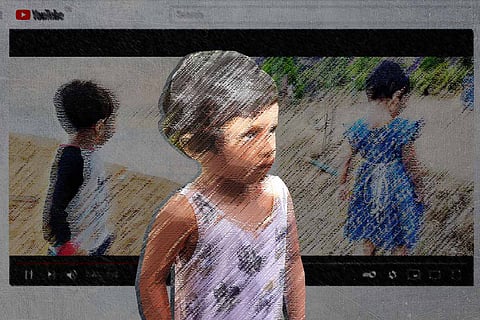

In 2017, Michael and Heather Martin, an American couple who ran the popular YouTube channels DaddyOFive and FamilyOFive, which had 7,60,000 subscribers, were sentenced to five years in prison. They had to shut down their channels and also lost custody of two of their five children. They were convicted for emotionally abusing their children in the prank videos uploaded on their YouTube channels. They made them cry, feel stressed and insecure through their pranks, which is a form of abuse.
Even if such pranks are staged, it can still inspire lakhs of viewers to do the same with children in their circle. There are a number of Malayalam YouTube channels where small children are involved in such prank videos. They are often crying and emotionally stressed in these videos.
In a channel named APPUZ TUBE VLOG, a 16-year-old boy has been posting prank videos of his little sister who is perhaps five or six years old. In many videos, it's clear that the parents are also involved in this. All the videos have close to a million views. The pranks involve shocking the small child by dressing up as a clown or zombie in the dark, with the video showing how the child cries in fear. One video even shows the brother convincing the child about the presence of a spirit with an Ouijja board. When she cries, he consoles her by giving her a snack.
There are also occasional videos, running into millions of views, by famous YouTubers pranking their little sisters who are not more than six years old. Though they apologise after making them cry or stressing them out, can the damage be undone? To what extent can a child so young process the stress that they were subjected to?
Speaking to TNM, Dr Gitanjali Natarajan, Professor of Clinical Psychology, Amrita Institute of Medical Sciences, Kochi, says that such pranks should be considered as abuse and that it is a crime. "In these videos, they think only from an adult's perspective, and they don't understand that children perceive this differently. For children, their cognitive functions, abilities, and language skill are different from adults. For adults, the emotions and perceptions can be reversed easily after they realise that it was a prank. But for a child, it is not easy to erase those perceptions," she points out.
Four months ago, a family video from the channel '1 kg Surprise TV' had gone viral with around two lakh views. In the video, a man, the father of a two-year-old child, brings home a woman and tries to convince his wife to give away their child for money. The wife, who isn't aware of the prank, argues and declines to give the child. In the video, the man tries to convince the mother for a long time to give away the child in front of the little girl. The child listens to everything that her father says. Unlike the other child pranking videos, many viewers have strongly condemned the video in the comments section.
"A 2 or 3-year-old can perceive certain things that their parents say. A child at that age can understand what her parents are saying about being with her. When the parents say that the child will be sent away from them, a lot of emotions will be triggered. They will feel insecure and undergo emotional trauma which cannot be reversed easily. It can affect their future too. It may not leave them, and the same feelings may recur even during small issues that they face in their future," Dr Gitanjali says. She adds that these experiences, even if brief, can create trauma in children.
Dr Vivek, who runs the famous YouTube channel The Mallu Analyst, has criticised such pranks in a recent video. "This conversation between the parents on selling the child, mother crying and opposing it, and the father trying to forcefully take the child... everything is witnessed by the child. They are not bothered about that. People use their own children in family vlogs for their selfish interests without considering how it will affect the child," Vivek says. "Pleasing the audience by scaring, teasing and making children cry, and gaining subscribers through this is not only a mistake but an issue that has to be taken seriously," he adds.